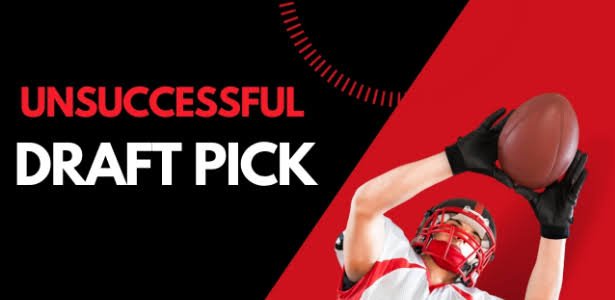Unsuccessful draft pick

Stepping onto the stage of professional sports as a highly anticipated draft pick comes with its own set of expectations and pressures. The spotlight shines brightly on these young athletes, but not all that glitters is gold. While some soar to greatness, others falter under the weight of high hopes and dreams. Join us as we delve into the world of unsuccessful draft picks, exploring the reasons behind their struggles and the impact it has on both player and team alike.
The pressure of being a draft pick
The pressure of being a draft pick is like standing at the edge of a cliff, with everyone watching to see if you’ll soar or stumble. Expectations loom large, weighing down on young shoulders that carry both talent and uncertainty. It’s not just about playing the game; it’s about living up to the hype, proving your worth with every move on the field.
For many athletes, being a draft pick means navigating uncharted territory, facing challenges that go beyond physical skills. The mental fortitude required to withstand the scrutiny and criticism can be overwhelming. Every misstep magnified, every success scrutinized – it’s a high-stakes game where failure is not an option.
But amidst all this pressure lies opportunity; an opportunity to rise above adversity, to defy expectations and carve out a legacy that transcends mere statistics. The journey of a draft pick is fraught with obstacles, but it’s also brimming with potential for growth and resilience in the face of uncertainty.
Common reasons for unsuccessful draft picks
Being an unsuccessful draft pick can happen for various reasons, often beyond the player’s control. One common reason is injuries that hinder a player’s performance and potential. Injuries can disrupt training, reduce playing time, and ultimately impact their development.
Moreover, a lack of fit with the team’s playing style or coaching staff can also lead to underperformance. When a player doesn’t mesh well with the team dynamics or system, it can be difficult for them to excel on the court.
Additionally, off-court issues such as personal struggles or distractions can impede a player’s focus and dedication to their sport. Mental health challenges or external pressures can significantly affect their performance during games.
Furthermore, some players may struggle to adapt to the competitive nature of professional sports leagues. The transition from college or overseas play to the intensity of professional basketball can be overwhelming for some athletes.
Case studies of notable failed draft picks
Every year, the anticipation surrounding the NFL draft is palpable. Teams meticulously analyze players to make their selections, hoping for future stars. However, not every pick turns out as expected.
One infamous failed draft pick was JaMarcus Russell, selected first overall by the Oakland Raiders in 2007. Despite his talent and potential, Russell struggled with consistency and dedication, ultimately leading to a short-lived career plagued by poor performance.
Another example is Ryan Leaf, chosen second overall by the San Diego Chargers in 1998. Regarded as one of the biggest busts in NFL history, Leaf’s off-field issues and inability to live up to expectations overshadowed his brief stint in the league.
These cases serve as cautionary tales for teams and aspiring athletes alike – success on draft day does not guarantee success on the field. The journey from draftee to star player is paved with challenges that require more than just raw talent – it demands resilience and unwavering determination.
Impact on the player and their career
The impact of being an unsuccessful draft pick on a player can be profound. It can shake their confidence, challenge their self-belief, and leave them questioning their abilities. This setback can affect not only their performance on the field but also their mental and emotional well-being off the field.
For many players, being labeled as an unsuccessful draft pick can create added pressure to prove themselves or live up to expectations that may feel unattainable. The constant scrutiny from fans, coaches, and the media can take a toll on their psyche and make it difficult for them to perform at their best.
Additionally, a failed draft pick can have long-lasting repercussions on a player’s career trajectory. It may limit opportunities for playing time, contract extensions, or endorsements. The road to redemption is often paved with obstacles that require resilience and unwavering determination.
How a player navigates the challenges of being an unsuccessful draft pick can shape not only their career but also define the strength of character they possess in overcoming adversity.
How teams can improve their selection process
When it comes to improving their selection process, teams can benefit from a comprehensive approach.
Conducting thorough research on potential draft picks is crucial. This includes analyzing not only the player’s performance on the field but also their character off the field.
Teams should prioritize communication and collaboration among scouts, coaches, and front office staff. By sharing insights and perspectives, a more informed decision can be made.
Additionally, utilizing advanced analytics and data-driven tools can provide valuable insights into a player’s potential success at the professional level.
Moreover, holding mock drafts and scenario-based exercises can help teams anticipate various outcomes and make better decisions under pressure.
Fostering a culture of continuous improvement within the organization will ensure that lessons learned from unsuccessful draft picks are incorporated into future selections.



